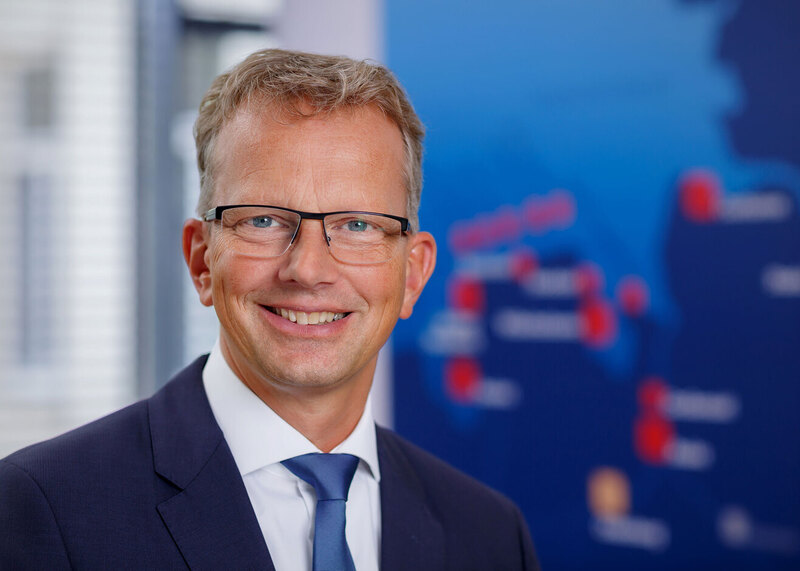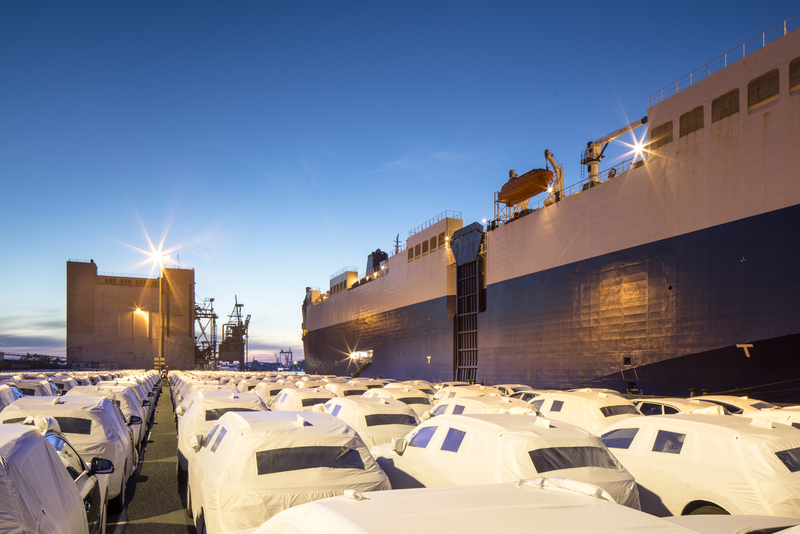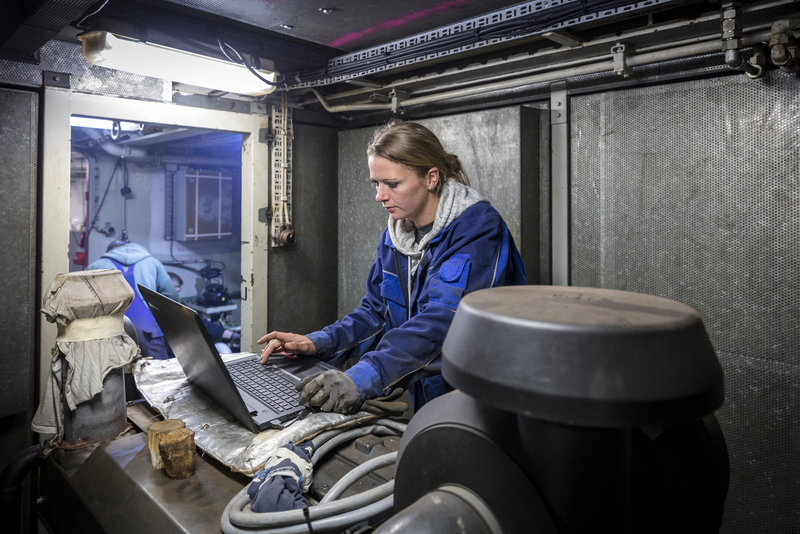30 October 2020
Mr. Holger Banik, CEO of Niedersachsen Ports, tells ESPO in the following interview how he got into maritime transport, the challenges and benefits of managing several ports, and his view on digitalisation. Discover below more about Niedersachsen Ports!
 (c) NPorts/Andreas Burmann
(c) NPorts/Andreas Burmann
Can you briefly present Niedersachsen Ports? What are its main characteristics?
Niedersachsen Ports is the port infrastructure company with the largest number of public seaports in Germany. We are responsible for five seaports, seven island supply ports, and three regional ports along the coastal region of Niedersachsen. Some of our core tasks include the development, construction and maintenance of the infrastructure, and in doing so, we are actively designing the future of the ports.
We have modern port facilities for general transshipment and handling at our disposal. At the same time, we can accommodate the needs of certain key industries with specialised equipment and services, and with the appropriate surface areas.
.jpg) (c) NPorts/Christian O.Bruch
(c) NPorts/Christian O.Bruch
How did you get into maritime transport? How did your career path lead to this position?
Before I became Spokesman of the Management Board of Niedersachsen Ports and Managing Director of the JadeWeserPort Realisierungs GmbH & Co. KG in January 2014, I had gained extensive experience in various positions and locations in the field of rail cargo traffic at Deutsche Bahn AG (German railway company). Among others, I have been Assistant to the Financial Director, then Director of Controlling at the branch Hannover/Bremen, Commercial Director at the branch Hamburg, as well as Director Planning and Reporting at their headquarters in Mainz. In 2007, I joined bremenports GmbH & Co. KG, first as Commercial Manager and, since 2011, as Commercial Managing Director.
While the Ministry of Economic Affairs, Labor, Transport and Digitalisation is the port authority, Niedersachsen Ports is operating the seaports of Lower Saxony. Could you explain the structure, the challenges and benefits of managing several ports, as well as the cooperation with the companies in the ports?
Each location has its specialisation and together we can accomplish anything: energy, motor vehicles, agricultural products, iron, steel or passenger transportation. In sum, Niedersachsen Ports is a 2700 ha multipurpose port. We are maintaining a continued high diversification within the cargo handling palette, while simultaneously strengthening the structures serving the growth markets.
As a 100% subsidiary of the state of Lower Saxony, we are entrusted with public tasks for the maintenance of the port infrastructure. One of our main tasks is to contribute to an economically strong region through direct business activities and indirect economic effects. All our revenue is returned to the region in the form of salaries and wages, taxes and any investments in our locations. Our customer structure is as diverse as our ports. On the water, these are German and international shipping companies; on the ground, these include industrial companies, logistics and railway companies. Our customers are mostly local or regional companies, or regional branches/factories of global companies (e.g. Volkswagen in Emden or Siemens in Cuxhaven).
At Niedersachsen Ports we consistently focus our actions on the continuous improvement of internal processes and services for our customers. We therefore implemented a quality management system in accordance with DIN EN ISO 9001:2015.
Managing several ports can only be accomplished together. That is why we bundle core competencies and learn from one another. It is our experience that we progress more quickly when we enter into cooperation agreements – in the ports and beyond the ports.
 (c) NPorts/Christian O.Bruch
(c) NPorts/Christian O.Bruch
What is your vision for the Niedersachsen Ports for the next decade?
We are successfully working to reach our sustainability goals. Sustainable thinking and action are an integral part of our business activities and the lifeline of our corporate culture. Our ports are vivid and livable locations.
The COVID-19 crisis is having a profound impact on the European economy and society. What has been the impact of the COVID-19 crisis on the Niedersachsen Ports? How have the Ports prepared themselves to guarantee that goods can continue to be handled in the port?
The COVID-19 crisis hits us just as hard as our customers: fewer ships called at our ports and the cargo handling declined, especially in April and May. Some of our construction projects are delayed due to the current crisis. Although the volume handled is slightly recovering, we expect to feel the effects of the crisis for the next two or three years.
But our ports have to be prepared for a post-corona era. We are therefore reallocating our investments – this affects both the projects and the time frames. We are thus re-prioritising projects to ensure the constant availability of our ports.
Due to the COVID-19 pandemic and its impact on global value and production chains, the debate on reshoring industry back to or closer to Europe and diversifying supply chains gained a new momentum. Do you think that, in time, we will see a reshoring of industry closer to Europe as well as more diversified supply chains?
Companies will certainly make efforts to make supply chains more crisis-proof in the future, for example by increasing inventories. Possibly some of the pre-productions will be shifted back. Nevertheless, the international division of labor will remain an essential element of global action in the future. This will be essential to maintain the international competitiveness of domestic products due to the different production costs in the different countries.
 (c) NPorts/Christian O.Bruch
(c) NPorts/Christian O.Bruch
European ports are increasingly investing in digital solutions to increase the efficiency of the logistics chain and port operations. Is Niedersachsen Ports taking any initiatives towards digitalisation? Do you think digitalisation can contribute to making port operations and the logistics chain more sustainable?
For us digitalisation is not a distant condition. When it comes to digitalised processes in ports as well as in supply and logistic chains: the future is now.
Intelligent use of data and its implementation in innovative applications simplifies processes, offers security and protects the environment. We are actively working on many projects with our business and research partners in all areas of the company, like for example, data exchange between ship and port. With an already implemented "Port Spot" app, inland waterway operators can conveniently enter their registration data on the go and receive feedback from us at an early stage - e.g. information about the specific berth in the port.
In the ongoing “SmartKai” project, security is the main focus. In difficult to navigate port areas, sensors are installed to enable ships to enter without any accident. This protects the ship and the port facilities and saves costs on both sides.
In the port area itself, we are discovering opportunities to become more sustainable with the help of digitisation. “DashPORT” project aims to show the energy flows in the port in order to intelligently control them. This means that energy can be used more efficiently and consumption should decrease.
As a port group, we have a particular advantage: we can immediately transfer the results of successful developed projects from one location to all the other ports – an important, sustainable added value.
 (c) NPorts/Christian O.Bruch
(c) NPorts/Christian O.Bruch
Germany holds the Presidency of the Council of the European Union until the end of this year. Do you have a message for the German Presidency?
We welcome the Commission's efforts to lead European countries towards a CO2-free future. But efforts should not be limited to the European area alone. It would be desirable to encourage non-European countries to follow this path as well.
Related documents
No attachments.
